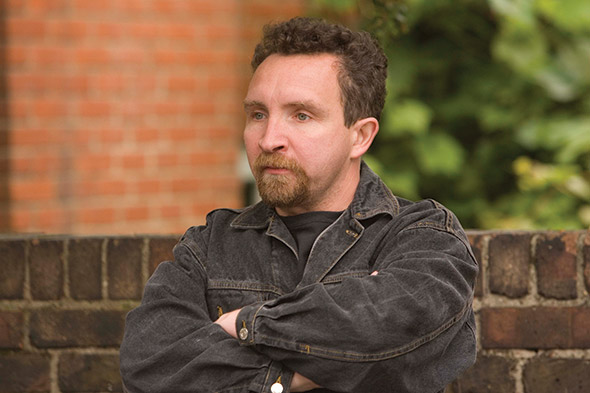
Text by Adam Keleman
“You can never sell a film on me,” reveals a candid Eddie Marsan, one of the players in Mike Leigh’s new film Happy-Go-Lucky. “My job is not to be anybody. My job is for no one to know who Eddie Marsan is. My job is to be the out-of-focus best friend to Johnny Depp.”
At 40 and with such humorous fatalism, Marsan is the consummate character actor; one of those non-leads that always gets second, or even third billing—no matter how compelling his role. In Happy-Go-Lucky, his title card may not be the first to appear, but his award-winning performance as Scott, the curmudgeonly driving instructor, is both painful and strikingly funny to watch. Ringing him up via mobile phone from across the pond, Marsan reflects on his early times growing up as a struggling actor on the East End of London, and his chain of small breaks.
As a young bloke stemming from the projects in Bethnal Green, London, Marsan’s passion for the art surfaced early on. “I knew I wanted to be an actor, but there were no facilities for pursuing it at the time.” He recounts, “Bethnal Green was one of the places whether you either turn out bad, or you do something creative.” Fortunately, he made it to the creative side of the tracks, utilizing his rough childhood to his advantage. “I had a very characteristic upbringing, and it initially defined my career… all I played were street guys,” he says. Typecasting like this might hamper any other actor’s ambitions, but for Marsan it was a foot in the door.
After leaving an apprenticeship with a printmaker, his family and friends supported him with odd jobs and free meals so that he could channel his time and effort into the uncharted territories of the theater. “I always studied acting when I wasn’t working. I never felt myself to be a natural actor, it was something I had to develop,” Marsan acknowledges. Even as he began to hone his craft, nothing could prepare him for the harsh realities of the film industry.
As he progressed in theater and various programs on the BBC, Marsan’s perseverance was tested. Surprisingly, his initial break into cinema was hampered—by his youth. “Initially, I don’t think they knew what to do with me,” he laughs. “It wasn’t until my thirties that I became employable. When you hit your thirties, you get a lot more work as a character actor. Now I’m in my forties, there’s even more work.” Marsan further cites his success as an aging actor on his unusual appearance: “Probably because I am a very-strange looking man.” To a point this rings true, but in the end sheer talent and hard work propelled him onto the celluloid.
From the Alpha of having scenes left on the cutting room floor to the Omega of starring in Mike Leigh films, Marsan has built up a diverse emotional arsenal—which as a character actor equals a thriving career path. “Because I’m a character actor, there are a lot of characters I can play,” he states plainly. “If I work on diversity, then I’ll work.” This mindset proved provident, as Marsan began landing parts in films as heterogeneous as Martin Scorsese’s Gangs of New York and Michael Mann’s Miami Vice. And he’s quite happy not having to supplicate his personal and career choices to the overwhelming demands of mainstream celebrity-dom. “We are freer to express ourselves,” he muses. “I was doing a movie with Colin Farrell, and he said, ‘You don’t know how lucky you are.’ In a sense, I could understand what he meant.” He may not bring in the “big dough” as does fellow thesp, Farrell, but Marsan’s flexibility as an actor ultimately landed him in the coveted company of celebrated British filmmaker Mike Leigh.
First in Vera Drake, and now in Happy-Go-Lucky, Marsan’s mutability has served him well alongside Mike Leigh’s improvisational techniques as a filmmaker. With no script in hand, Leigh and his actors shape the characters in a collaborative process from an initial outline and concept. In reference to the car scenes he had with Sally Hawkins, Marsan confessed to Leigh: “It may be due to my limited knowledge of film, but I’ve never seen anything like this. Two characters so extreme stuck in a car.” Marsan now coyly remarks, “I had no idea this was going to be a comedy… I thought I was going to be the next Travis Bickle,” There may be some validity in comparing his character’s psychotic fits to the protagonist in Scorsese’s Taxi Driver, but it is the playfully impromptu back and forth between him and Hawkins which elevates the scenes to high comedy. “Happy-Go-Lucky is one of my favorite Mike Leigh features. I don’t think the characters change much during the films, but I think the audience does,” he says. Garnering much acclaim for his role in the film, Marsan walked away with the British Independent Film Award for Best Supporting Actor, and has Academy members talking.
Before he signs off for the night, Marsan underscores his pin-balling, chameleon-esque career with one last quip: “I finished my last scene on Happy-Go-Lucky on a Thursday. On Monday I was in downtown LA trying to kill Will Smith for Hancock. Variety is the spice of life.”

